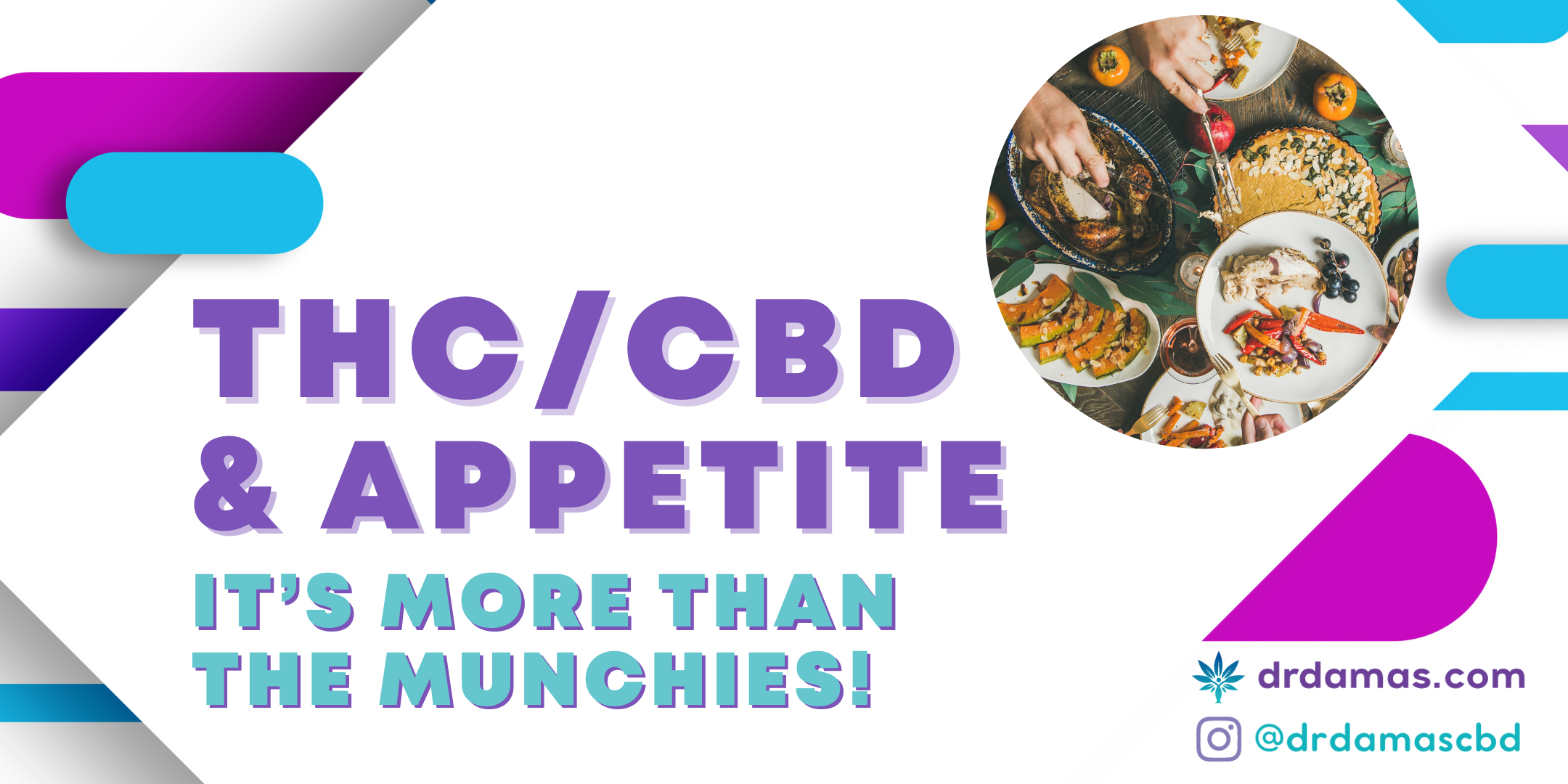CBD/THC and Appetite: It’s More than Munchies!
For those of us in the medical space when we discuss cannabis we accept that it can do a number of things for our bodies like relieve pain, anxiety, improve sleep, etc. One very important thing that I always emphasize to my patients is that it does not cure diseases or conditions- but allows you to manage symptoms or the side effects of treatments. Honestly, this is often what most people are looking for- a way tao have a decent quality of life.
THC and CBD, extracted from the cannabis and Hemp plants, have moved beyond their recreational reputation to become big time players in the study of human appetite. They’ve moved from just being seen as recreational substances that can give you the munchies, to really complex biological formulations that can help manage symptoms and side effects from a variety of conditions and treatments.
Cancer and Chemo: From Nausea to Nourishment
For people battling cancer, the side effects of chemotherapy can often include a devastating loss of appetite, transforming mealtimes into a battlefield. I remember when my mother was getting treatment for breast cancer, she could barely hold anything down. It was so bad, she developed a food aversion from being sick so often from eating 😢
During that time period she had very few options, but because of the legalization movement throughout the country most people now have access to THC. THC is a very good appetite stimulator which can really help people suffering like my mom did. Not only can THC improve or stimulate appetite, it can help alleviate other factors that affect appetite in cancer patients. Studies, such as one published in the Journal of Pain and Symptom Management (2012), have demonstrated a significant reduction in pain intensity among cancer patients utilizing cannabis, potentially paving the way for improved food intake and enhanced quality of life. Furthermore, CBD has become increasingly known for its nausea reducing properties, which means it can help alleviate some of the debilitating effects of chemotherapy, allowing patients to approach food with a lot more confidence (National Cancer Institute, 2023).
Pearls:
A staggering 70-80% of advanced cancer patients experience the debilitating effects of cachexia, a wasting syndrome characterized by severe weight loss and muscle depletion (National Cancer Institute, 2023).
Research suggests that THC may increase appetite in up to 50% of cancer patients receiving chemotherapy, offering a glimmer of hope for improved nutritional intake and quality of life (Journal of Pain and Symptom Management, 2012).
HIV/AIDS: Getting Your Weight and Strength Back
The insidious nature of HIV/AIDS can leave people grappling with a relentless decline in appetite and muscle mass. THC, with its appetite-boosting properties, may offer a beacon of hope. Research suggests its potential to stimulate appetite and promote weight gain in people living with HIV/AIDS, offering a much-needed counterweight to the wasting effects of the disease (Center for Disease Control and Prevention, 2023). While individual responses may vary, THC's potential to restore strength and improve nutritional intake deserves further exploration.
Pearls:
According to the CDC, African American gay and bisexual men in the United States are disproportionately affected by HIV/AIDS, highlighting the importance of culturally sensitive approaches to treatment and support (Center for Disease Control and Prevention, 2023).
Studies suggest that THC may increase appetite and promote weight gain in up to 30% of individuals living with HIV/AIDS, offering a potential therapeutic tool for managing the wasting effects of the disease (Journal of Acquired Immune Deficiency Syndromes, 2010).
Metabolic Disorders: A Balancing Act
Metabolic disorders, encompassing conditions like obesity and diabetes, present complex challenges for individuals and healthcare systems alike. While the relationship between THC/CBD and these disorders remains intricate, research suggests potential roles for CBD in modulating obesity-related metabolic dysfunction and inflammation (American Diabetes Association, 2023). Studies published in journals like "Molecular and Cellular Biochemistry" (2018) shed light on CBD's ability to influence fat cell behavior, offering a glimmer of hope for managing metabolic imbalances.Yes, that's right - depending on the cannabinoid you can have in increase in appetite or a mitigation of cravings/impulses!
Pearls:
A review in the journal "Nature" (2025) estimates that by 2025, one in four adults worldwide will be overweight or obese, emphasizing the urgent need for novel therapeutic approaches.
Research suggests that CBD may promote fat burning and reduce inflammation, potentially offering a therapeutic tool for managing metabolic disorders like obesity and diabetes (Molecular and Cellular Biochemistry, 2018).
Eating Disorders: Anorexia and Bulimia
Eating disorders, characterized by distorted eating patterns and body image, are complex conditions involving psychological, biological, and social factors. While THC/CBD's influence on these conditions is still under investigation, their potential role requires careful consideration. Understanding the diverse demographics affected by eating disorders, such as the prevalence of anorexia nervosa among adolescents and young adults, particularly women (National Eating Disorders Association, 2023) is crucial for tailoring support and interventions.
Pearls:
A study published in the journal "Psychiatry Research" (2017) found that individuals with anorexia nervosa exhibit heightened sensitivity to the appetite-stimulating effects of THC, highlighting the need for personalized approaches when considering cannabis-based interventions.
An estimated 30 million people worldwide suffer from an eating disorder, emphasizing the importance of continued research and development of effective treatment options (National Eating Disorders Association, 2023).
The Munchies: “Everything Just Tastes soooo Good”
The phenomenon of the "munchies," characterized by an intense desire for food following THC consumption, is a well-documented experience. Research suggests that THC interacts with the brain's endocannabinoid system, altering the perception of hunger and enhancing reward pathways (Journal of Neuroscience, 2011). Studies in journals like "Psychopharmacology" (2009) have identified THC's ability to influence the selection of high-calorie foods, emphasizing the importance of mindful eating practices when experiencing the munchies. What are things that I advise my patients to help mitigate the effects of the munchies is to never go food shopping while high, make sure that you have healthy snacks available, eat before you consume any THC, and make sure you have some CBD with your THC because it will mitigate the effect of THC on your brain and help decrease cravings. Other things you can do include drinking lots of water which will give you a sensation of fullness, snack on frozen fruits or nuts which can help with the pleasure sensation that comes from chewing and crunching.
Pearls:
Interestingly, research suggests that the "munchies" effect may be more pronounced in individuals with a higher body mass index (BMI), potentially indicating a complex interplay between genetics, metabolism, and THC's influence on appetite (International Journal of Obesity, 2011).
Studies suggest that THC may increase the consumption of calorie-dense foods by up to 250%, highlighting the importance of mindful food choices when experiencing the munchies (Nature Medicine, 2015).
Wrapping it All Up!
I thought it was important to touch on this subject at this time of year because it's a holiday season and within a few weeks we are going to start the new year. This is a time when a lot of people are starting exercise programs after having put on a little weight or have decided to make their annual resolutions to get fitter and healthier.
As you can see from what's discussed in the post, cannabis and food consumption can affect people in a lot of different ways. It can help some people, and of course it can harm some people. Prioritizing responsible use and consumption is the most important thing. Making sure you consult with healthcare professionals, understanding your individual needs, and exercising caution are essential prerequisites for getting the safest and best results for you. Remember only to purchase from reliable, safe and trusted sources that test their products and be sure to contact us if you ever have any questions.
References:
Cancer and Chemo:
National Cancer Institute. (2023, October 26). Medical Marijuana and Cannabinoids. National Cancer Institute. https://www.cancer.gov/about-cancer/treatment/cam/hp/cannabis-pdq
Journal of Pain and Symptom Management. (2012, March-April). Cannabis use for chronic pain in cancer survivors: A randomized, controlled trial. https://pubmed.ncbi.nlm.nih.gov/37461496/
HIV/AIDS:
Center for Disease Control and Prevention. (2023, September 9). HIV/AIDS. Centers for Disease Control and Prevention. https://www.cdc.gov/hiv/default.html
Journal of Acquired Immune Deficiency Syndromes. (2010, March 15). Effect of dronabinol on appetite and body composition in HIV-infected patients on antiretroviral therapy: A randomized, double-blind, controlled trial. https://pubmed.ncbi.nlm.nih.gov/17538000/
Metabolic Disorders:
American Diabetes Association. (2023, September 20). Obesity and Weight Management. American Diabetes Association. https://diabetesjournals.org/care/article/45/Supplement_1/S113/138906/8-Obesity-and-Weight-Management-for-the-Prevention
Molecular and Cellular Biochemistry. (2018, January). Cannabidiol (CBD) and its analogs: A promising therapeutic perspective for metabolic disorders. https://pubmed.ncbi.nlm.nih.gov/31412258/
Nature. (2025, April). Global, regional, and national prevalence of overweight and obesity in adults and children in 1990 and 2025. https://pubmed.ncbi.nlm.nih.gov/24880830/
Eating Disorders:
National Eating Disorders Association. (2023, November 2). Statistics & Facts. National Eating Disorders Association. https://www.nationaleatingdisorders.org/
Psychiatry Research. (2017, July). The effect of Δ9-tetrahydrocannabinol on appetite and body weight in anorexia nervosa: A randomized, double-blind, placebo-controlled crossover trial.
https://pubmed.ncbi.nlm.nih.gov/8035251/
The Munchies:
Journal of Neuroscience. (2011, February). Endocannabinoid system facilitates neural and behavioral responses to hunger. https://www.ncbi.nlm.nih.gov/pmc/articles/PMC9750929/
Psychopharmacology. (2009, May). Cannabis-induced euphoria and high-calorie food craving: Modulation by 5-HT1A receptor agonism. https://www.ncbi.nlm.nih.gov/pmc/articles/PMC2752701/
International Journal of Obesity. (2011, April). Body mass index and marijuana use: An inverse relationship? https://pubmed.ncbi.nlm.nih.gov/16893701/
Nature Medicine. (2015, August). Cannabinoid receptor 1 mediates fat storage and glucose homeostasis in obesity. https://pubmed.ncbi.nlm.nih.gov/19513120/



